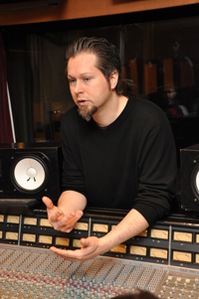"I started in the mid-'80s as a drummer and experimental electronic musician. I took some classes at UCLA's extension program for recording engineering, and one of my instructors said, 'What you really need to do is get a job as a runner at a recording studio. Go and clean the toilets and make coffee and pick up lunch and drive tapes around town.' Back then that was about the only way to get into the business. If you're motivated enough, you learn the ropes from the engineers that are on the staff there. Eventually you learn enough that you can convince the management to start putting you on sessions as an assistant engineer, and assisting on sessions is when you really learn."
"I worked at the Complex, which is the studio in west Lost Angeles that George Massenburg designed. Then around the mid-'90s things started really changing in the business. Project studios became a new paradigm, where for better or worse, people with less outlay of cash could put a small studio together, not spending millions of dollars on gear, but thousands. As a DIY-minded guy I was among the first people to really pick up on that and embrace it. I bought some gear and expanded my little home recording setup into a modest little studio, and started working with independent artists and labels. I did that alongside working at the Complex for a while, and eventually just busted out on my own and did the independent engineer thing. That same project studio has been evolving all this time, getting better equipped and more suited to my working style."
"For me, teaching is basically just geeking out in the studio about all the stuff I love to do. It's like that end of the day hangout when we're done in the studio. In a teaching context it's more structured, but it's still pretty much me sharing things I know and experiences I've had."
"Recording music is taking part in a kind of alchemy—you're transforming intangible, cerebral ideas into something real, something physical. It's a sort of magic. And you're working with material that is personal, emotional. Appreciating that and being sensitive to it is one of the most important things we can teach. Studio work is social. You can't do it without the technical knowledge, but you can't do it well without fostering a good creative environment. That's something I really want to pass along, because it isn't something that books can really teach, but it's the kind of thing that gets you work or not; it's the kind of thing that gets a record made well or not."

